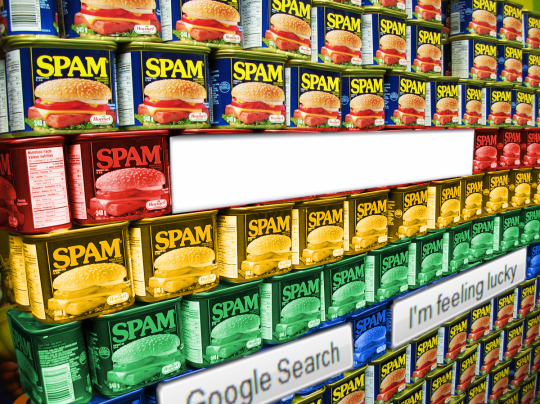#Sport Magazine
Explore tagged Tumblr posts
Text


HAPPY MONDAY ONLY TO KING CHARLES LECLERC
#charles leclerc#f1#scuderia ferrari#ferrari#monaco gp#monaco gp 2024#the prince of monaco#leclerc#cl16#f1 2024#sport#corriere dello sport#tutto sport#carlos sainz#leo leclerc#sport magazine
43 notes
·
View notes
Text

Sport Magazine (January 1976)
#1976#1970s#70s#Sport Magazine#American football#sports#Cincinnati Bengals#Cincinnati#Ohio#Dave Lapham#Ken Anderson#~
28 notes
·
View notes
Text










Imane Khelif photographed by Sam Rock for d la Repubblica
#yes please god keep giving this woman magazine covers#imane khelif#boxer#athlete#sports#fashion#magazine#photography#sam rock#d la repubblica
7K notes
·
View notes
Text

رابط تحميل العدد الأول من الأهرام الرياضي 👇👇👇
#الأهرام الرياضي#كورابيديا#koraapedia#كرة_القدم#football#كرة القدم#soccer#كرة القدم المصرية#الزمالك#بيبو#الأهلي#مجلات رياضية#مجلات عربية#magazine#sport magazine
1 note
·
View note
Text
Google is (still) losing the spam wars to zombie news-brands

I'm touring my new, nationally bestselling novel The Bezzle! Catch me TONIGHT (May 3) in CALGARY, then TOMORROW (May 4) in VANCOUVER, then onto Tartu, Estonia, and beyond!

Even Google admits – grudgingly – that it is losing the spam wars. The explosive proliferation of botshit has supercharged the sleazy "search engine optimization" business, such that results to common queries are 50% Google ads to spam sites, and 50% links to spam sites that tricked Google into a high rank (without paying for an ad):
https://developers.google.com/search/blog/2024/03/core-update-spam-policies#site-reputation
It's nice that Google has finally stopped gaslighting the rest of us with claims that its search was still the same bedrock utility that so many of us relied upon as a key piece of internet infrastructure. This not only feels wildly wrong, it is empirically, provably false:
https://downloads.webis.de/publications/papers/bevendorff_2024a.pdf
Not only that, but we know why Google search sucks. Memos released as part of the DOJ's antitrust case against Google reveal that the company deliberately chose to worsen search quality to increase the number of queries you'd have to make (and the number of ads you'd have to see) to find a decent result:
https://pluralistic.net/2024/04/24/naming-names/#prabhakar-raghavan
Google's antitrust case turns on the idea that the company bought its way to dominance, spending the some of the billions it extracted from advertisers and publishers to buy the default position on every platform, so that no one ever tried another search engine, which meant that no one would invest in another search engine, either.
Google's tacit defense is that its monopoly billions only incidentally fund these kind of anticompetitive deals. Mostly, Google says, it uses its billions to build the greatest search engine, ad platform, mobile OS, etc that the public could dream of. Only a company as big as Google (says Google) can afford to fund the R&D and security to keep its platform useful for the rest of us.
That's the "monopolistic bargain" – let the monopolist become a dictator, and they will be a benevolent dictator. Shriven of "wasteful competition," the monopolist can split their profits with the public by funding public goods and the public interest.
Google has clearly reneged on that bargain. A company experiencing the dramatic security failures and declining quality should be pouring everything it has to righting the ship. Instead, Google repeatedly blew tens of billions of dollars on stock buybacks while doing mass layoffs:
https://pluralistic.net/2024/02/21/im-feeling-unlucky/#not-up-to-the-task
Those layoffs have now reached the company's "core" teams, even as its core services continue to decay:
https://qz.com/google-is-laying-off-hundreds-as-it-moves-core-jobs-abr-1851449528
(Google's antitrust trial was shrouded in secrecy, thanks to the judge's deference to the company's insistence on confidentiality. The case is moving along though, and warrants your continued attention:)
https://www.thebignewsletter.com/p/the-2-trillion-secret-trial-against
Google wormed its way into so many corners of our lives that its enshittification keeps erupting in odd places, like ordering takeout food:
https://pluralistic.net/2023/02/24/passive-income/#swiss-cheese-security
Back in February, Housefresh – a rigorous review site for home air purifiers – published a viral, damning account of how Google had allowed itself to be overrun by spammers who purport to provide reviews of air purifiers, but who do little to no testing and often employ AI chatbots to write automated garbage:
https://housefresh.com/david-vs-digital-goliaths/
In the months since, Housefresh's Gisele Navarro has continued to fight for the survival of her high-quality air purifier review site, and has received many tips from insiders at the spam-farms and Google, all of which she recounts in a followup essay:
https://housefresh.com/how-google-decimated-housefresh/
One of the worst offenders in spam wars is Dotdash Meredith, a content-farm that "publishes" multiple websites that recycle parts of each others' content in order to climb to the top search slots for lucrative product review spots, which can be monetized via affiliate links.
A Dotdash Meredith insider told Navarro that the company uses a tactic called "keyword swarming" to push high-quality independent sites off the top of Google and replace them with its own garbage reviews. When Dotdash Meredith finds an independent site that occupies the top results for a lucrative Google result, they "swarm a smaller site’s foothold on one or two articles by essentially publishing 10 articles [on the topic] and beefing up [Dotdash Meredith sites’] authority."
Dotdash Meredith has keyword swarmed a large number of topics. from air purifiers to slow cookers to posture correctors for back-pain:
https://housefresh.com/wp-content/uploads/2024/05/keyword-swarming-dotdash.jpg
The company isn't shy about this. Its own shareholder communications boast about it. What's more, it has competition.
Take Forbes, an actual news-site, which has a whole shadow-empire of web-pages reviewing products for puppies, dogs, kittens and cats, all of which link to high affiliate-fee-generating pet insurance products. These reviews are not good, but they are treasured by Google's algorithm, which views them as a part of Forbes's legitimate news-publishing operation and lets them draft on Forbes's authority.
This side-hustle for Forbes comes at a cost for the rest of us, though. The reviewers who actually put in the hard work to figure out which pet products are worth your money (and which ones are bad, defective or dangerous) are crowded off the front page of Google and eventually disappear, leaving behind nothing but semi-automated SEO garbage from Forbes:
https://twitter.com/ichbinGisele/status/1642481590524583936
There's a name for this: "site reputation abuse." That's when a site perverts its current – or past – practice of publishing high-quality materials to trick Google into giving the site a high ranking. Think of how Deadspin's private equity grifter owners turned it into a site full of casino affiliate spam:
https://www.404media.co/who-owns-deadspin-now-lineup-publishing/
The same thing happened to the venerable Money magazine:
https://moneygroup.pr/
Money is one of the many sites whose air purifier reviews Google gives preference to, despite the fact that they do no testing. According to Google, Money is also a reliable source of information on reprogramming your garage-door opener, buying a paint-sprayer, etc:
https://money.com/best-paint-sprayer/
All of this is made ten million times worse by AI, which can spray out superficially plausible botshit in superhuman quantities, letting spammers produce thousands of variations on their shitty reviews, flooding the zone with bullshit in classic Steve Bannon style:
https://escapecollective.com/commerce-content-is-breaking-product-reviews/
As Gizmodo, Sports Illustrated and USA Today have learned the hard way, AI can't write factual news pieces. But it can pump out bullshit written for the express purpose of drafting on the good work human journalists have done and tricking Google – the search engine 90% of us rely on – into upranking bullshit at the expense of high-quality information.
A variety of AI service bureaux have popped up to provide AI botshit as a service to news brands. While Navarro doesn't say so, I'm willing to bet that for news bosses, outsourcing your botshit scams to a third party is considered an excellent way of avoiding your journalists' wrath. The biggest botshit-as-a-service company is ASR Group (which also uses the alias Advon Commerce).
Advon claims that its botshit is, in fact, written by humans. But Advon's employees' Linkedin profiles tell a different story, boasting of their mastery of AI tools in the industrial-scale production of botshit:
https://housefresh.com/wp-content/uploads/2024/05/Advon-AI-LinkedIn.jpg
Now, none of this is particularly sophisticated. It doesn't take much discernment to spot when a site is engaged in "site reputation abuse." Presumably, the 12,000 googlers the company fired last year could have been employed to check the top review keyword results manually every couple of days and permaban any site caught cheating this way.
Instead, Google is has announced a change in policy: starting May 5, the company will downrank any site caught engaged in site reputation abuse. However, the company takes a very narrow view of site reputation abuse, limiting punishments to sites that employ third parties to generate or uprank their botshit. Companies that produce their botshit in-house are seemingly not covered by this policy.
As Navarro writes, some sites – like Forbes – have prepared for May 5 by blocking their botshit sections from Google's crawler. This can't be their permanent strategy, though – either they'll have to kill the section or bring it in-house to comply with Google's rules. Bringing things in house isn't that hard: US News and World Report is advertising for an SEO editor who will publish 70-80 posts per month, doubtless each one a masterpiece of high-quality, carefully researched material of great value to Google's users:
https://twitter.com/dannyashton/status/1777408051357585425
As Navarro points out, Google is palpably reluctant to target the largest, best-funded spammers. Its March 2024 update kicked many garbage AI sites out of the index – but only small bottom-feeders, not large, once-respected publications that have been colonized by private equity spam-farmers.
All of this comes at a price, and it's only incidentally paid by legitimate sites like Housefresh. The real price is borne by all of us, who are funneled by the 90%-market-share search engine into "review" sites that push low quality, high-price products. Housefresh's top budget air purifier costs $79. That's hundreds of dollars cheaper than the "budget" pick at other sites, who largely perform no original research.
Google search has a problem. AI botshit is dominating Google's search results, and it's not just in product reviews. Searches for infrastructure code samples are dominated by botshit code generated by Pulumi AI, whose chatbot hallucinates nonexistence AWS features:
https://www.theregister.com/2024/05/01/pulumi_ai_pollution_of_search/
This is hugely consequential: when these "hallucinations" slip through into production code, they create huge vulnerabilities for widespread malicious exploitation:
https://www.theregister.com/2024/03/28/ai_bots_hallucinate_software_packages/
We've put all our eggs in Google's basket, and Google's dropped the basket – but it doesn't matter because they can spend $20b/year bribing Apple to make sure no one ever tries a rival search engine on Ios or Safari:
https://finance.yahoo.com/news/google-payments-apple-reached-20-220947331.html
Google's response – laying off core developers, outsourcing to low-waged territories with weak labor protections and spending billions on stock buybacks – presents a picture of a company that is too big to care:
https://pluralistic.net/2024/04/04/teach-me-how-to-shruggie/#kagi
Google promised us a quid-pro-quo: let them be the single, authoritative portal ("organize the world’s information and make it universally accessible and useful"), and they will earn that spot by being the best search there is:
https://www.ft.com/content/b9eb3180-2a6e-41eb-91fe-2ab5942d4150
But – like the spammers at the top of its search result pages – Google didn't earn its spot at the center of our digital lives.
It cheated.

If you'd like an essay-formatted version of this post to read or share, here's a link to it on pluralistic.net, my surveillance-free, ad-free, tracker-free blog:
https://pluralistic.net/2024/05/03/keyword-swarming/#site-reputation-abuse

Image: freezelight (modified) https://commons.wikimedia.org/wiki/File:Spam_wall_-_Flickr_-_freezelight.jpg
CC BY-SA 2.0 https://creativecommons.org/licenses/by-sa/2.0/deed.en
#pluralistic#google#monopoly#housefresh#content mills#sponcon#seo#dotdash meredith#keyword swarming#iac#forbes#forbes advisor#deadspin#money magazine#ad practicioners llc#asr group holdings#sports illustrated#advon#site reputation abuse#the algorithm tm#core update#kagi#ai#botshit
901 notes
·
View notes
Text




KATE UPTON. ph. Yu Tsai for Sports Illustrated Swimsuit 2024.
#kate upton#modeledit#modelsedit#fashionedit#fashion#sports illustrated#si swimsuit#sports illustrated swimsuit#magazine#photoshoot#photoset#edit#yennerys
249 notes
·
View notes
Text

#classic cars#photography#wonderful#cars#old cars#classic car#fast cars#car show#car#vintage cars#electric cars#convertible#lamborghini#oldsmobile#old car#bugatti#sports cars#beautiful photos#photoshop#vintage photography#1950s#vintage illustration#vintage moodboard#life magazine#kitsch#vintage fashion#50s#picture#photoshoot#cadillac
451 notes
·
View notes
Text

Jessica White for Sports Illustrated (2007)
2K notes
·
View notes
Text




Covers of the Soviet magazine "Physical Culture and Sports" (1958—1973)
89 notes
·
View notes
Text





SHA'CARRI RICHARDSON
for Teen Vogue (February 23, 2022) — photographed by Izack Morales
#sha'carri richardson#shacarri richardson#teen vogue#teen vogue magazine#izack morales#olympics#olympics 2024#paris olympics#olympian#track athletics#sports#usa#wlw#sapphic#sapphics#bisexual#bi#dailywomen#dailywoc#wonderfulwomendaily#wonderfulwoc#femaledaily#femalestunning#femalesource#userladies#userladiesblr#breathtakingqueens#thequeensofbeauty#flawlessbeautyqueens#flawlesscelebs
194 notes
·
View notes
Text

Angel Reese for WSJ
#angel reese#chicago sky#wnba#women's basketball#basketball#wbb#women in sports#wsj#wall streeet journal#wsj magazine
120 notes
·
View notes
Text

How Other Magazines Would Photograph A Playmate: National Geographic & Sports Illustrated (Playboy 1970)
#playboy magazine#photography#vintage photography#vintage#retro#aesthetic#beauty#seventies#70s#70s model#1970s#pin up#pinup#national geographic#sports illustrated
270 notes
·
View notes
Text
Adorkable Twilight & Friends - “Hardcore Sports"

Adorkable Patreon Pals
Adorkable Twilight & Friends Twitter
Adorkable Twilight & Friends Wiki
Adorkable Twilight & Friends Deviant Art
#adorkable twilight & friends#adorkable#comic#adorkable twilight#twilight sparkle#humor#cute#friendship#family#magazines#tv#sports#spike#moondancer#pinenut#cat#starlight glimmer#relaxing#relax#study#office
84 notes
·
View notes
Text

Hawks🦅🦅🦅
but Figure Skater AU lets goooo
#my hero academia#bnha#fanart#hawks#keigo takami#pretty bird boi#okay guys so i was doing an assignment#gotta design a sport magazine cover#and my group chose hanyu yuzuru#AND I JUST THOUGHT KEIGO WOULD BE A LOVELY SKATER#you know the famous mysterious handsome skillful guy =))#definitely stealing hearts#also slaying on the ice#and this is just a color sketch guys no more rendering bc i haven't design his costume yet#i love how the color turned out :')
57 notes
·
View notes
Text

1969 GM Buick advertisement
#1969#Buick#opal#gs#car#automotive#automobile#vintageadsmakemehappy#vintage magazine#vintage advertising#magazine#advertising#60s#1960s#classic#muscle car#sports cars
245 notes
·
View notes
Text

A woman driving a sports car around Hollywood, with a great dane 'Thor' riding in the passenger seat. Photographed in 1961 by Ralph Crane. Published in Life magazine

#life#ralph crane#dog#pets#doggo#great dane#1960s#vintage#retro#black and white#colorized#red sports car#vibes#california#hollywood#thor#life magazine
130 notes
·
View notes